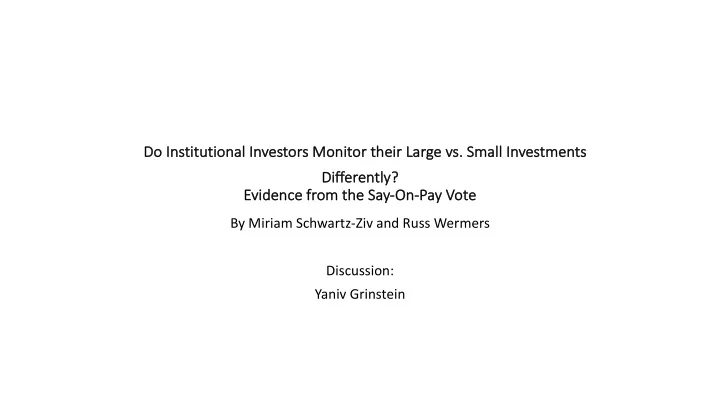

Do Do I Instit itutio ional I al Investors M Monit itor t their ir L Lar arge v vs. S Small I all Investments Dif Differently ly? Ev Evidence from the Say-On On-Pa Pay Vote By Miriam Schwartz-Ziv and Russ Wermers Discussion: Yaniv Grinstein
Motivation • Institutional investors and monitoring • Do institutional investors monitor corporate actions? • How does ownership size affect institutional investors incentives to monitor?
This study • Examine institutional investors’ voting behavior with respect to SOP. • Distinguish between institutions who each has large holdings in the firm and institutions who each has low holdings in the firm. • Focus on voting by mutual funds – aggregate their voting at the institution level. • Main findings: • Institutions with low holdings tend to vote against SOP. • The result persists after controlling for other drivers of institutional voting. e.g., Shareholder services recommendations) • The result is more pronounced when there are blockholders who own shares in the firm. • The result is more pronounced at the institutional level than at the advisory level.
Comments • Excellent study • Interesting findings • Formation of hypotheses • Massive data collection and thorough analysis. • Addressing endogeneity issues • My comments: • Setting • Theoretical foundations and hypotheses. • Empirical analysis
Say on Pay (or more generally proposals against CEO compensation) – What do we know? • “Vote No” campaigns can reduce excessive pay - Ertimur, Ferri, and Muslu (2011) • Armstrong, Gow, and Larcker (2013) - No evidence that lower shareholder support for proposed equity compensation plans leads to lower future CEO pay. • Cai and Walkling (2011) - Mixed results from the announcement effect of SOP rules • Larcker, Ormazabal, and Taylor (2011) - Negative results from announcement of SOP and compensation-related regulation -. • Ferri and Maber (2013) - Say on pay can reduce egregious practices; has little impact on pay levels. • Conyon and Sadler (2010) - Say on pay does not reduce pay levels. • Iliev and Vitanova (2015) - Say on pay improves perceptions of governance; does not reduce pay.
Hypotheses: Monitoring motivation and Small Holdings • Hypothesis 1: • Institutions with large shareholdings in the firm tend to vote with management. Reason is that they take advantage of other forms of monitoring (e.g., communication with management) to affect corporate decisions (including compensation). • Hypothesis 2: • Institutions with large shareholdings have short-term incentives. They do not have enough incentives to vote against management because such vote will lower the stock price in the short-run.
What do we mean by large shareholdings of an institution?
What we mean by large shareholdings of a fund?
Additional possibilities: Monitoring motivation and Small Holdings • The “who monitor the monitor” hypothesis: • Institutions or fund managers with small holdings have less incentives to monitor the firm and are therefore either not voting or voting against management for the wrong reasons.
Recommendations • What determines fund with small holdings (compared to large holdings) voting choice? • Firm performance? (monitoring) • Fund performance? (tantrum) • ISS recommendation? • A more sophisticated bargaining game between these institutions and companies? • Interaction of the control variables (performance, etc) with the holdings themselves could give us additional insights into the motivation behind the voting choice. • The dependent variable “fraction voting for” is driven by both the decision of the institution/the fund to vote and its decision how to vote. Differentiate between no-vote and voting against.
Additional Recommendations • Documentation of negative abnormal returns associated with negative votes: • Are these returns driven by firms with institutions with large holdings? Or with small holdings? • Hypothesis1 predicts that it will be institutions with small holdings. • Very interesting findings regarding the effect of blockholders on large-shareholders and small shareholders’ voting behavior. Would like to know the driver for this. Are blockholders good or bad?
Summary • Excellent study • My comments: • Would like to differentiate more among the hypotheses.
Recommend
More recommend